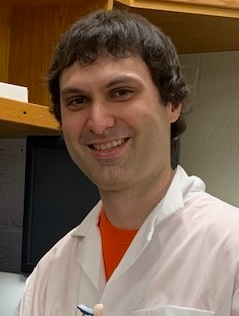Assistant Professor, Department of Food, Nutrition, and Packaging Sciences
Biosketch
Dr. Alexis “Stocko” Stamatikos is currently a tenure-track assistant professor at Clemson University and has been in this position since January of 2019. Before joining Clemson University, Dr. Stamatikos received his PhD in nutritional sciences at Texas Tech University and completed a dietetic internship at Texas A&M University-Kingsville. Dr. Stamatikos also received postdoctoral training in vascular biology and gene therapy within the Department of Medicine, Division of Cardiology, at University of Washington. While at University of Washington, Dr. Stamatikos was initially supported by an NIH/NHLBI-funded T32 Cardiovascular Research Training Program and then later awarded an American Heart Association (AHA) postdoctoral fellowship grant. Since becoming a PI at Clemson University, Dr. Stamatikos has received funding from NIH, AHA, and USDA.
Research
Atherosclerosis is a disease caused by lipid accumulation within the arterial wall which can result in narrowing of the arteries. Atherosclerosis leads to more deaths worldwide than any other disease because atherosclerosis is the primary cause of both heart attacks and strokes. Although atherosclerosis has been extensively studied, the pathogenesis and pathophysiology of this disease are not entirely elucidated and treatments for atherosclerosis are only partially effective. Dr. Stamatikos and his laboratory are primarily focused on atherosclerosis research. Dr. Stamatikos’ research interests include identifying mechanisms that drive atherosclerosis and developing innovative atheroprotective therapeutics. A main research area of Dr. Stamatikos’ laboratory is assessing the impact of vascular inflammation and vessel wall cell cholesterol efflux on atherogenesis and atherosclerosis progression. Another major research area of the Stamatikos lab is the development of novel exosome/lipoparticle-based anti-atherosclerotic therapies.
Publications
Huang K, Jo H, Echesabal-Chen J, Stamatikos A. Combined LXR and RXR Agonist Therapy Increases ABCA1 Protein Expression and Enhances ApoAI-Mediated Cholesterol Efflux in Cultured Endothelial Cells. Metabolites. 2021;11:640. (PMID: 34564456)
Esobi IC, Barksdale C, Heard-Tate C, Reigers Powell R, Bruce TF, Stamatikos A. MOVAS Cells: A Versatile Cell Line for Studying Vascular Smooth Muscle Cell Cholesterol Metabolism. Lipids. 2021;56:413-422. (PMID: 33881166)
Bi L, Wacker BK, Stamatikos A, Sethuraman M, Komandur K, Dichek DA. Jugular Vein Injection of High-Titer Lentiviral Vectors Does Not Transduce the Aorta. Arterioscler Thromb Vasc Biol. 2021;41:1149-1155. (PMID: 33297756)
Stamatikos A, Knight E, Vojtech L, Bi L, Wacker BK, Tang C, Dichek DA. Exosome-Mediated Transfer of Anti-miR-33a-5p from Transduced Endothelial Cells Enhances Macrophage and Vascular Smooth Muscle Cell Cholesterol Efflux. Hum Gene Ther. 2020;31:219-232. (PMID: 31842627)
Stamatikos A, Dronadula N, Ng P, Palmer D, Knight E, Wacker B, Tang C, Kim F, Dichek DA. ABCA1 Overexpression in Endothelial Cells In Vitro Enhances ApoAI-Mediated Cholesterol Efflux and Decreases Inflammation. Hum Gene Ther. 2019;30:236-248. (PMID: 30079772)
Wacker BK, Dronadula N, Bi L, Stamatikos A, Dichek DA. Apo A-I (Apolipoprotein A-I) Vascular Gene Therapy Provides Durable Protection Against Atherosclerosis in Hyperlipidemic Rabbits. Arterioscler Thromb Vasc Biol. 2018;38:206-217. (PMID: 29122817)
